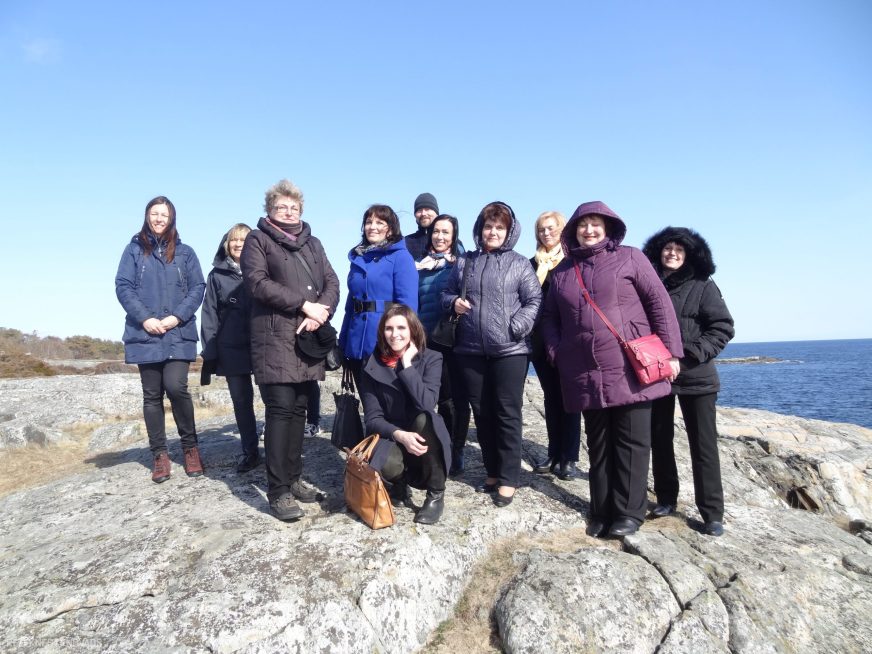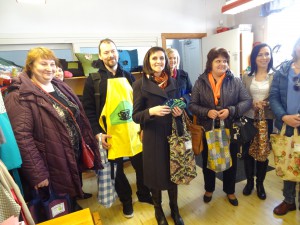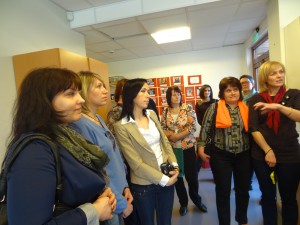Social workers and representatives of the Special Education Support Centre visit Norwegian counterparts

At the beginning of April, the representatives of the municipality of Rēzekne went to the city of Norway, Arendal, where, for several days, he knew Norwegian experience in the care of old people and working with people with special needs, as well as discussed the possibilities of future cooperation projects.
In the event of an exchange of experience, Silvija Strankale, head of the social service, with children and families, Zita Bautre, social workers Einars Aleksandrs Bindemanis, Iveta novika and Anita Ikauniece, Ilona Bruskovska and Natalia Melne, social pedagogy Lilija Šodnaka, and the head of the development planning department, Inta Rimšāne, took part in the trip.
During the trip, the delegation visited the Asdal Rehabilitation Centre for children with special needs, the Miratunetas old-age care centre, the Sam Eide High School, in which  a training programme for children with special needs is implemented to help them start their own lives and find work as well as the family support centre. “On the basis of the Norwegian experience, the Rēzekne municipality would also need such a family support centre where timely and targeted assistance to families in crisis would be provided,” said the social worker of Maltese, Iveta novika. As the participant of the trip told, Audrinu parish social worker Einars Aleksandrs Bindemanis, representatives of Rezekne municipality also knew the experience of Norwegian volunteers in the care of the old people: “I think people in Latvia could find time about once a week to go to someone who needs help – the most important thing is to change the attitude of our people to volunteering and to teach people to be socially responsible. In Norway, volunteers are mostly employed by people at early retirement age, while they are likely to be young people. 'The social worker of Audrinu civil parish also highly appreciated the home care system – a service in which medical staff and homework assistants are employed, which can be summoned by elderly and incapacitated people:“ In Norway, lonely pensioners can afford to stay at their home rather than go to a homeland, because they are sure that someone will help, ”said Einars Alexander Bindemanis.
a training programme for children with special needs is implemented to help them start their own lives and find work as well as the family support centre. “On the basis of the Norwegian experience, the Rēzekne municipality would also need such a family support centre where timely and targeted assistance to families in crisis would be provided,” said the social worker of Maltese, Iveta novika. As the participant of the trip told, Audrinu parish social worker Einars Aleksandrs Bindemanis, representatives of Rezekne municipality also knew the experience of Norwegian volunteers in the care of the old people: “I think people in Latvia could find time about once a week to go to someone who needs help – the most important thing is to change the attitude of our people to volunteering and to teach people to be socially responsible. In Norway, volunteers are mostly employed by people at early retirement age, while they are likely to be young people. 'The social worker of Audrinu civil parish also highly appreciated the home care system – a service in which medical staff and homework assistants are employed, which can be summoned by elderly and incapacitated people:“ In Norway, lonely pensioners can afford to stay at their home rather than go to a homeland, because they are sure that someone will help, ”said Einars Alexander Bindemanis.
Social  the pedagogy Lilly Schodnak, after her experience, highly rated the centre for pregnant women, babies and children in Norway: “In the centre, all activities are carried out sequentially and thoughtfully: both the pregnant woman and the child have been in the sight of the specialists since birth, following the condition of the child's health and development, as well as each child is provided with assistance in time, including the appointment of a co-ordinator who draws up the individual plan and attaches the necessary specialists to remedy the health problems in a timely manner.”
the pedagogy Lilly Schodnak, after her experience, highly rated the centre for pregnant women, babies and children in Norway: “In the centre, all activities are carried out sequentially and thoughtfully: both the pregnant woman and the child have been in the sight of the specialists since birth, following the condition of the child's health and development, as well as each child is provided with assistance in time, including the appointment of a co-ordinator who draws up the individual plan and attaches the necessary specialists to remedy the health problems in a timely manner.”
“In Norway, children with special needs are successfully integrated into the school life,” acknowledged the representative of the Education Administration Support Centre Ilona Bruskovska. “At the start of the school, each child with special needs is provided with a special educator who is working with a child on a daily basis. In addition, for each child, the pedagogical-psychological Commission specialists, together with the special pedagogue and the parents of the child, shall draw up an individual educational plan. In Norway, it was felt every step that not only the parents, but also the local government, were responsible for people with special needs,” said I.Bruskovska.
The representatives of the Rēzekne municipality are pleasantly surprised by the non-falsified intolerance of people with special needs: “every person is a value that must be respected and supported,” the Norwegian employer says the head of the social service of Rezekne, Sylvia Strankale, “all employees are tolerant, patient and human. In addition, during the week of the project, every child has the opportunity to feel herself in the place of a special child, that is, if you don't see, do not hear, or be able to move fully, in such a way as to raise the empathy of the children. '
At the end of the visit, representatives of Arendal and Rezekne Municipality agreed that other special educational and social workers would also be worth working on the next day of exchange of experience, so that new ideas for future work could be transferred to Latvia by “shading” the work of specialists of interest in Norway.
Madara Laksa
Public relations specialist of the municipality of Rezekne